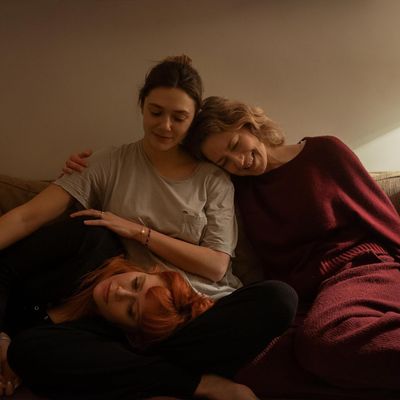
His Three Daughters star Elizabeth Olsen will be at Vulture Festival, which is on November 16 and 17, in Los Angeles. Get tickets here before they sell out!
Azazel Jacobs’s His Three Daughters begins with a series of dense, almost theatrical monologues, delivered by the three grown children of a dying man. It’s a striking, potentially fatal way to start a movie, but the women in question are played by three enormously talented actresses. First up is Carrie Coon’s Katie, having assumed for herself the mantle of the adult in the room, delineating a rapid-fire list of tasks, observations, and subtle grievances to her sister Rachel (Natasha Lyonne). After her comes Elizabeth Olsen’s Christina, prim and proper and the youngest of the three, who currently seems to be spending the most time watching over their dad, who is in his bedroom attached to a morphine drip, receiving hospice care at home. Christina’s wide-eyed motherliness nevertheless hints at deep reserves of doubt; she’s the kind of person who will end her statements with a quick nod, as if trying to convince herself that what she just said is the truth. And then there’s Lyonne’s Rachel, the overwhelmed pothead who’s been living in this New York apartment with their aging father for years, even though she can’t bring herself to go into his room now. Rachel doesn’t talk so much as react, trying to process the onslaught of words coming from her sisters — who are really her adopted sisters, as Rachel was raised by their dad as his own after he married her mom, many years ago.
Jacobs’s film, now on Netflix, will not continue in this register. That opening burst of theatricality soon softens, as these three very different women try, each in her own way, to deal with the fact that their father isn’t long for this world. For most of the movie, we don’t even see him. Mostly, these women — who have grown apart, but aren’t quite estranged — go at each other. Katie has a litany of complaints against Rachel, chief among them the fact that she smokes her weed in the apartment. When Rachel tries to smoke outside, of course, the building’s superintendent asks her to take it inside. And while nobody would describe her as pliant, she dutifully abides in both cases, ping-ponging between the apartment and the building’s courtyard, berated at each turn.
Jacobs’s screenplay does stack the deck against Katie and Christina somewhat. One is the paragon of an all-business, middle-age rich city girl, and the other a soft-spoken suburban yoga mom. They both feel more like types than people, at times even flirting with parody. Rachel, with her live-and-let-live, who-me attitude, seems like she’s just trying to survive her sisters’ visit. It’s meant to be a familiar dynamic but edges uncomfortably into the predictable, the rote. We know the film will complicate these characters somewhat, but it never really surprises us with what it reveals about these women or their relationships to their father.
That’s not a fatal problem, because the performers make these people worth watching. Coon, who so often gets stuck with thankless supporting roles in movies, wins us over to Katie’s constant agitation. She has a way of looking directly at the people she’s speaking to — her gaze is not quite withering, but it demands answers. We understand that this woman is always trying to get things done because, well, none of it will get done otherwise. Olsen, meanwhile, finds subtle ways to suggest that Christina’s limpid, clear-eyed warmth and positivity are attempts to compensate for all sorts of insecurity. And Lyonne’s raspy, understated charm endears us to Rachel’s devil-may-care haplessness. Again, none of this is unexpected, or uncommon, but these actors find ways to make it interesting.
Does the film go anywhere with any of this? Can it? His Three Daughters is a movie about waiting, and it’s a movie that often feels like it’s waiting — for death, for reconciliation, for a confrontation, for something, anything. We know the sisters will understand each other a bit better by the end of all this, and Jacobs gets at something true about how simply standing watch over a dying loved one, day after day, can be exhausting, alienating, without any kind of emotional reward. In choosing not to show the father for the vast majority of the movie, he ensures that we will focus on the daughters’ interactions with each other — even though so much of how they see and speak to one another is determined by their histories with dad.
Seen in that light, there’s a weird logic to how the movie ends. (Spoilers follow, even though this isn’t really a plot movie.) When we finally see the father (played by Jay O. Sanders), as the girls roll him out of his deathbed and plop him in his favorite recliner, he seems a lot more lucid than we’ve been led to believe. Then, in a moment of intriguing surrealism, dad tears off the various tubes covering his face and body, walks to the kitchen, pours himself a drink, and launches into his own monologue about his daughters and how much he loves New York. It’s an intriguing moment — soon revealed, of course, to be a fantasy. But it feels like something out of a different movie, a deus ex machina designed to bring reconciliation and closure that doesn’t prompt any real understanding or reflection. It feels more like Jacobs just didn’t know how to end his movie and simply didn’t want to end it on the mundane, cloying image of a man dying. In his own way, we suspect, he’s having as hard a time coming to terms with death as his characters are.
More Movie Reviews
- The Thriller Drop Is a Perfect Addition to the Bad-First-Date Canon
- The Accountant 2 Can Not Be Taken Seriously
- Another Simple Favor Is So Fun, Until It Gets So Dumb


